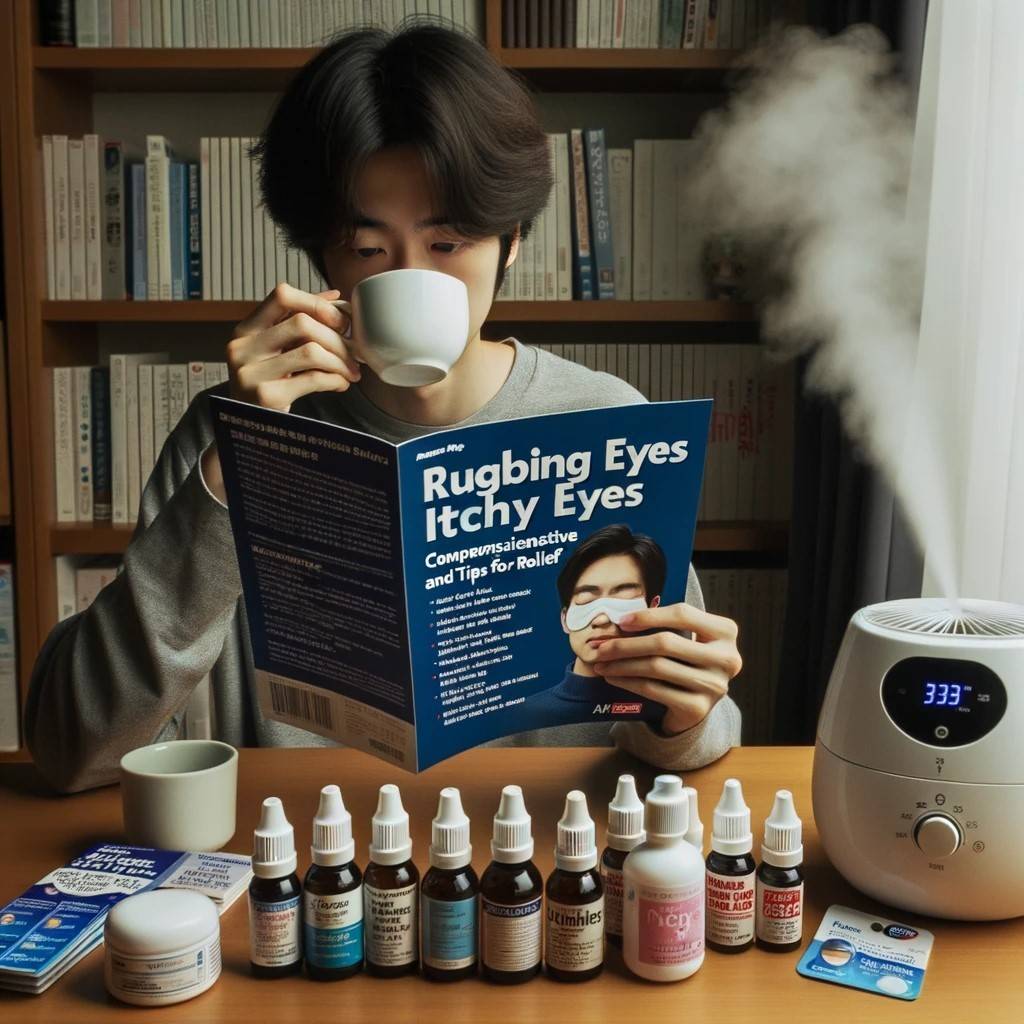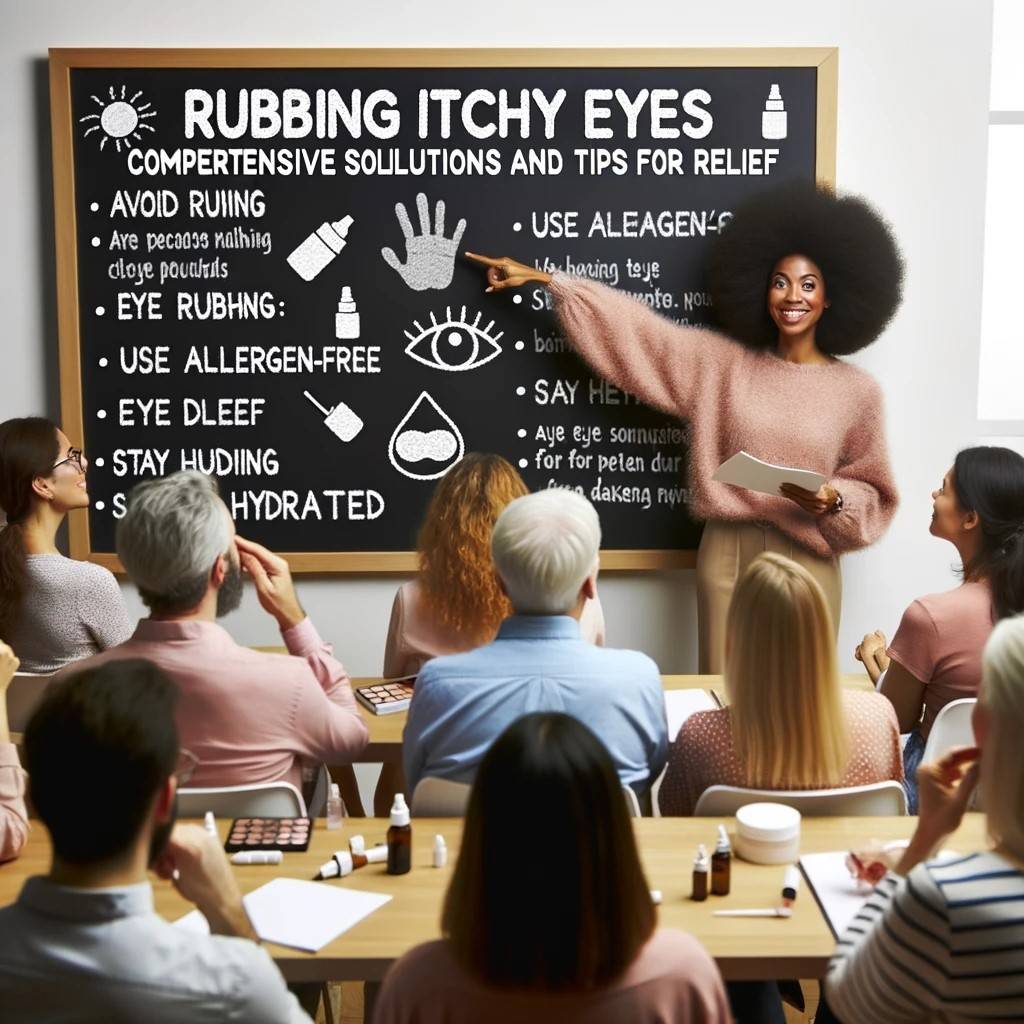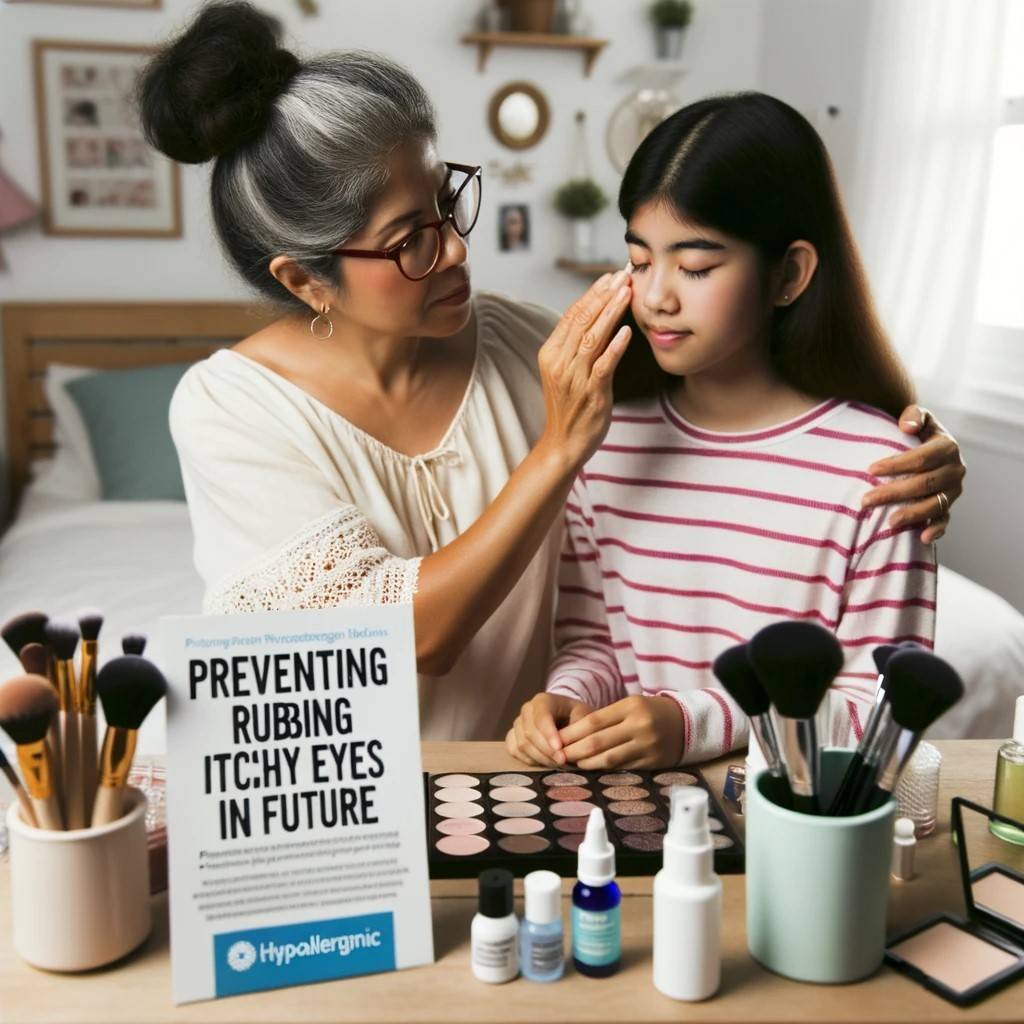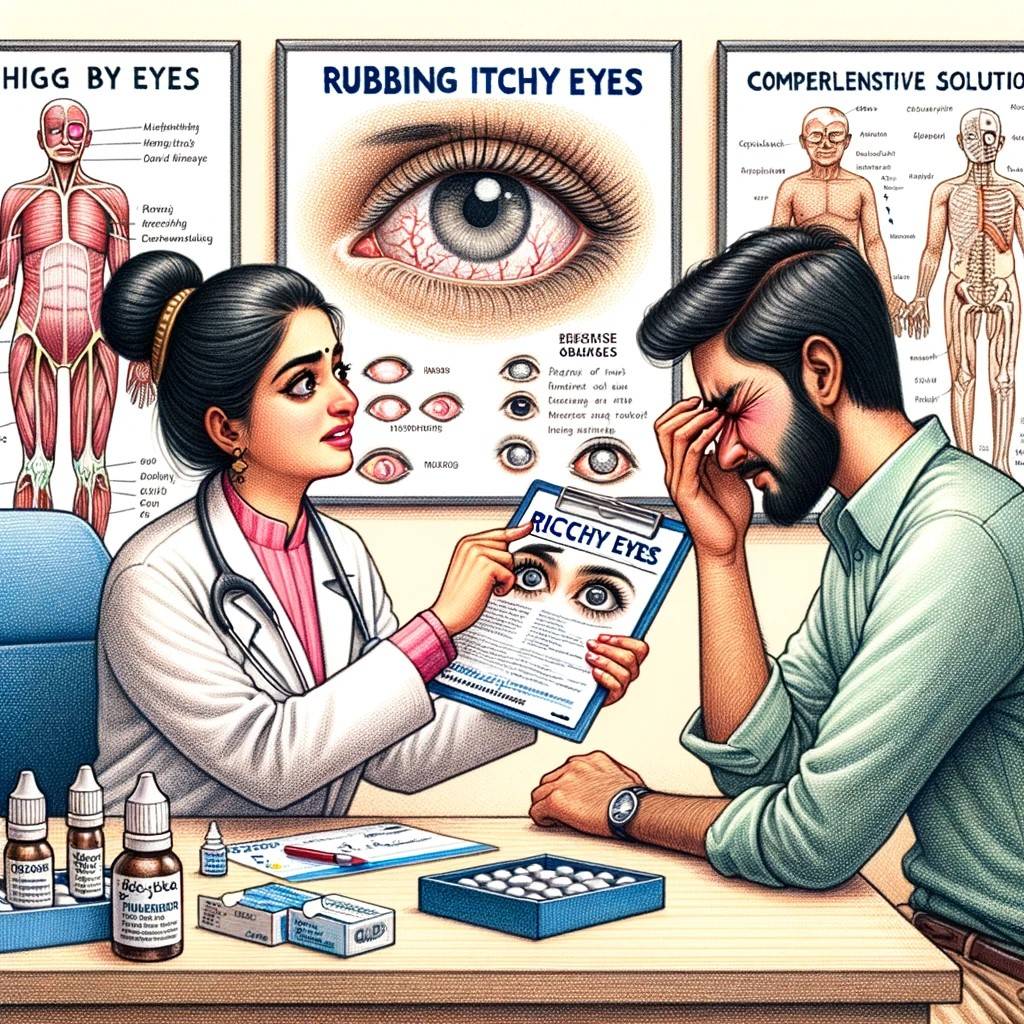Rubbing Itchy Eyes: Comprehensive Solutions and Tips for Relief
Discover comprehensive solutions and expert tips for relief from rubbing itchy eyes. Put an end to the discomfort with Rubbing Itchy Eyes guide.
Introduction to Rubbing Itchy Eyes

Have you ever found yourself in an endless loop of rubbing your eyes, only to find they itch even more afterward? It’s a common scenario for many, especially during certain seasons or after a long day of staring at screens. But do you know why our eyes itch in the first place and why rubbing them might not be the best solution? In this guide, we’ll delve deep into the causes, dangers, and, most importantly, solutions for those pesky itchy eyes.
Understanding the Causes of Itchy Eyes

Our eyes are sensitive, and multiple factors can lead to that irritating itch. Recognizing the root cause can be the first step toward finding relief.
Common External Irritants
Dust and Pollen: Pollen levels rise with the changing seasons, especially during spring and fall. This can be a nightmare for people living with allergies. Similarly, dust in our homes or workplaces can easily irritate our eyes.
Cosmetic Products: Have you ever felt a sting after applying mascara or eyeliner? Some makeup products contain chemicals that will not sit well with our eyes, leading to that familiar itch.
Contact Lens Solutions: Not all solutions are created equal. Some might contain preservatives that cause discomfort for certain individuals.
Medical Conditions Leading to Itchy Eyes
Allergies: Beyond just pollen, other allergens like pet dander or mould can cause our eyes to itch. Recent research has shown that allergies are on the rise globally, making this a prevalent cause.
Dry Eyes Syndrome: Our eyes naturally produce tears to stay lubricated. However, factors like age, medications, or certain medical conditions can reduce tear production, leading to dry and itchy eyes.
Conjunctivitis: Commonly known as pinkeye, this is an inflammation of the eye’s outermost layer. It can be caused by viruses, bacteria, or allergens.
Blepharitis: This is an inflammation of the eyelids, often resulting from a bacterial infection or skin condition.
Environmental Factors
Smoke and Pollution: Urban areas with high pollution levels can have a direct impact on our eye health. Smoke, whether from cigarettes or industrial sources, can be particularly irritating.
Digital Eye Strain: In our digital age, many of us spend hours in front of screens. This can reduce our blink rate, leading to drier and itchier eyes.
Changes in weather or humidity: Low-humidity environments, often experienced in winter or air-conditioned rooms, can dry out our eyes.
Why Rubbing Itchy Eyes Can Be Harmful?
The immediate relief felt from rubbing our eyes is undeniable. However, this short-lived satisfaction can lead to longer-term issues.
Potential Damage to the Eye
Risk of Infections: Our hands are breeding grounds for bacteria. Every time we touch our eyes, we introduce these germs, increasing the risk of infections.
Scratching the Cornea: The cornea is the eye’s outer layer. Aggressive rubbing can lead to tiny scratches, which are not only painful but can become infected.
Worsening Existing Eye Conditions: For those already dealing with eye issues, rubbing can exacerbate the problem.
Aggravating Allergies
Releasing More Histamines: Rubbing can release more histamines in the eye area, making the itching even worse. It’s a vicious cycle!
Spreading Allergens: By touching your eyes, you can spread allergens, leading to increased irritation.
Effective Solutions for Rubbing Itchy Eyes and Tips
Finding relief from itchy eyes doesn’t always mean a trip to the doctor. Here are some tried and tested remedies.
Over-the-Counter Solutions
Antihistamine Eye Drops: These are designed to counteract the body’s histamine response, providing instant relief from itching.
Lubricating Eye Drops: Also known as artificial tears, they can help combat dryness.
Cool Compresses: A simple and effective method. A chilled cloth placed over the eyes can reduce itching and inflammation.
Home Remedies
Cold Tea Bags: Tea contains anti-inflammatory properties. Chilled tea bags placed on the eyes can provide relief.
Cucumber Slices: A classic spa treatment, cucumbers have cooling properties that can soothe irritated eyes.
Aloe Vera Gel: Known for its healing properties, it can be applied around the eyes for relief. Ensure it’s free from additives and always conduct a patch test first.
Lifestyle Changes
Reducing Screen Time: Take regular breaks using the 20-20-20 rule: every 20 minutes, look at something 20 feet away for 20 seconds.
Ensuring Clean Hands: Always wash hands before touching the eyes or handling contact lenses.
Regularly Cleaning Contact Lenses: Using a recommended solution and replacing them as advised is crucial.
When to Seek Professional Help
While home remedies and over-the-counter solutions can be effective, it’s crucial to recognize when professional intervention is required.
Recognizing Serious Symptoms for Rubbing Itchy Eyes
Persistent Redness or Swelling: If your eyes remain red or swollen for an extended period, it might be more than just an irritant.
Pain in the Eyes: Discomfort is one thing, but genuine pain can indicate a more severe issue, such as an infection or injury.
Blurry Vision or Sensitivity to Light: These symptoms can point to conditions like uveitis or corneal abrasion.
Persistent Redness or Swelling: If your eyes remain red or swollen for an extended period, it might be more than just an irritant.
Pain in the Eyes: Discomfort is one thing, but genuine pain can indicate a more severe issue, such as an infection or injury.
Blurry Vision or Sensitivity to Light: These symptoms can point to conditions like uveitis or corneal abrasion.
Consulting an Eye Specialist
Seeking timely advice from an eye care professional is essential. They can provide:
A Comprehensive Eye Exam: This can help identify underlying issues causing the itchiness.
Prescription Medications: For chronic or severe conditions, over-the-counter solutions might not suffice.
Expert Advice: Sometimes, getting tips tailored to your specific situation can make all the difference.
Preventing Rubbing Itchy Eyes in the Future

Prevention is always better than cure. Here are some proactive steps to keep those itches at bay.
Tips for people living with allergy
Keeping Windows Closed During Pollen Seasons: This can reduce the influx of allergens into your living space.
Using Allergen-Reducing Eye Drops: Proactively using these during high pollen seasons can be a significant change.
Wearing Sunglasses Outdoors: These act as a barrier, protecting your eyes from allergens.
General Eye Care Tips
Avoiding Rubbing Eyes: Even when the itch is unbearable, resist. Use a cool compress or eye drops instead.
Taking Breaks from Screens: This can help reduce digital eye strain.
Staying Hydrated: Drinking enough water supports natural tear production, keeping dryness at bay.
FAQs for Rubbing Itchy Eyes
Q: Why does rubbing my eyes make them itchy?
A: Rubbing your eyes can release histamines, which are chemicals your body produces during allergic reactions. These histamines can make the itching even worse. Plus, our hands carry dirt and bacteria, and touching the eyes can introduce these irritants, leading to further itchiness. It’s a bit like scratching a bug bite – it might feel good for a moment, but it can make the itchiness intensify.
Q: What happens if I rub my eyes too much?
A: Overdoing the eye rubbing can be harmful. For starters, you risk injuring the delicate tissues, like the cornea. You might also introduce dirt or bacteria, increasing the risk of infections. Additionally, excessive rubbing can worsen conditions like allergies, as it releases more histamines. In the long run, constant rubbing might even lead to wrinkles around the eyes because of the skin stretching. So, while it might be tempting, it’s best to find other ways to soothe those itchy eyes.
Q: What is a natural remedy for itchy eyes?
A: There are several natural remedies you can try! Cold compresses can be a quick relief. Just take a clean cloth, soak it in cold water, and place it over your closed eyes. Another remedy is using chilled cucumber slices or cold tea bags on the eyes. Both have anti-inflammatory properties that can soothe itchiness. Aloe vera gel, known for its healing properties, can also be applied around the eyes, but always do a patch test first to avoid any adverse reactions.
Q: How do you soothe irritated eyes?
A: Soothing irritated eyes can be a combination of remedies and preventive measures. Over-the-counter lubricating eye drops can provide instant relief. If your eyes are itchy because of allergens, try to keep your living environment clean, reduce exposure to irritants, and consider using allergen-reducing eye drops. Taking breaks from screens, ensuring you blink regularly, and staying hydrated can also help keep irritation at bay. And remember, while rubbing might offer temporary relief, it’s not the best solution for irritated eyes.
Conclusion
In our journey through the world of “Rubbing Itchy Eyes,” we’ve explored causes, consequences, remedies, and preventive measures. Remember, our eyes are one of our most precious assets. Treating them with care and seeking timely advice can ensure they remain healthy and comfortable.
Finally.
Have you tried any remedies that worked wonders for your itchy eyes? Share your experiences in the comments below! And if you found this guide helpful, do share it with friends and family. Your eyes will thank you!

Adel Galal is a health and wellness writer with over 30 years of experience studying and writing about health, fitness, nutrition, and healthy living. He is the founder of NextFitLife.com, where he shares practical, evidence-based guidance to support long-term health at any age. Adel’s mission is simple:
to help people make smarter health choices that fit real life, at any age.



